Personality Matters: Mitt Romney has Al Gore Problem
Mitt Romney’s Al Gore Problem (Dana Milbank, Washington Post, Jan. 13, 2012) — Following Mitt Romney on the campaign trail is a painful yet familiar experience. Painful, because of the wince-inducing moments when you realize that, for all of Romney’s success in imitating human attributes, there remain glitches in the matrix that reveal him to be different from the rest of us. … Full report
Commentary

Dana Milbank’s opinion of Mitt Romney’s personological shortcomings as a presidential candidate is the most insightful I’ve seen in the mainstream media. As I wrote elsewhere in this blog on Aug. 9, 2011, Mitt Romney — despite being the early front-runner in public opinion polls – is unlikely to be the Republican presidential nominee but, if he is, will not emerge as a viable challenger to Barack Obama.
As I noted last summer, Romney’s score of 6 on the Personal Electability Index (which has accurately predicted the outcome of every presidential election since 1996), ranks near the bottom among presidential candidates I’ve studied in the past four presidential election cycles. Compared with the two recent presidential candidates that in Milbank’s opinion most closely resemble Romney, Romney’s PEI score is marginally worse than John Kerry’s lackluster score of 9, though considerably better than Al Gore’s record-low score of -17.
Following are the PEI scores of some of the presidential candidates referenced by Milbank.
Mitt Romney: PEI = 6
| Scale: | 1A | 1B | 2 | 3 | 4 | 5A | 5B | 6 | 7 | 8 | 9 | 0 |
| Score: | 7 | 4 | 5 | 2 | 4 | 0 | 3 | 12 | 1 | 0 | 4 | 4 |
Romney: [Extraversion (scale 3) = 2] + [Narcissism (scale 2) = 5] + [Dominance (scale 1A) = 7] – [Introversion (scale 8) = 0] – [Conscientiousness (scale 6) = (12 – 4)] = 6
Al Gore: PEI = –17
| Scale: | 1A | 1B | 2 | 3 | 4 | 5A | 5B | 6 | 7 | 8 | 9 | 0 |
| Score: | 8 | 2 | 3 | 1 | 4 | 1 | 3 | 22 | 5 | 11 | 12 | 0 |
Gore: [Extraversion (scale 3) = 1] + [Narcissism (scale 2) = 3] + [Dominance (scale 1A) = 8] – [Introversion (scale 8) = 11] – [Conscientiousness (scale 6) = (22 – 4)] = –17
John Kerry: PEI = 9
| Scale: | 1A | 1B | 2 | 3 | 4 | 5A | 5B | 6 | 7 | 8 | 9 | 0 |
| Score: | 6 | 6 | 7 | 0 | 3 | 0 | 3 | 5 | 2 | 3 | 0 | 0 |
Kerry: [Extraversion (scale 3) = 0] + [Narcissism (scale 2) = 7] + [Dominance (scale 1A) = 6] – [Introversion (scale 8) = 3] – [Conscientiousness (scale 6) = (5 – 4)] = 9
George W. Bush: PEI = 31
| Scale: | 1A | 1B | 2 | 3 | 4 | 5A | 5B | 6 | 7 | 8 | 9 | 0 |
| Score: | 11 | 5 | 4 | 16 | 4 | 0 | 0 | 2 | 0 | 0 | 0 | 4 |
Bush: [Extraversion (scale 3) = (16 – 1)] + [Narcissism (scale 2) = 5] + [Dominance (scale 1A) = 11] – [Introversion (scale 8) = 0] – [Conscientiousness (scale 6) = (2 – 2)] = 30
Barack Obama: PEI = 28
| Scale: | 1A | 1B | 2 | 3 | 4 | 5A | 5B | 6 | 7 | 8 | 9 | 0 |
| Score: | 10 | 6 | 11 | 9 | 7 | 1 | 2 | 5 | 4 | 1 | 0 | 4 |
Obama: [Extraversion (scale 3) = 9] + [Narcissism (scale 2) = 11] + [Dominance (scale 1A) = 10] – [Introversion (scale 8) = 1] – [Conscientiousness (scale 6) = (5 – 4)] = 28
Personality patterns: dimensional continuum of personality types
1A Dominant: Asserting–Controlling–Aggressive (Sadistic)
1B Dauntless: Adventurous–Dissenting–Aggrandizing (Antisocial)
2 Ambitious: Confident–Self-serving–Exploitative (Narcissistic)
3 Outgoing: Congenial–Gregarious–Impulsive (Histrionic)
4 Accommodating: Cooperative–Agreeable–Submissive (Dependent)
5A Aggrieved: Unpresuming–Self-denying–Self-defeating (Masochistic)
5B Contentious: Resolute–Oppositional–Negativistic (Passive aggressive)
6 Conscientious: Respectful–Dutiful–Compulsive (Obsessive compulsive)
7 Reticent: Circumspect–Inhibited–Withdrawn (Avoidant)
8 Retiring: Reserved–Aloof–Solitary (Schizoid)
Analysis of Al Gore’s personal deficits as a presidential candidate
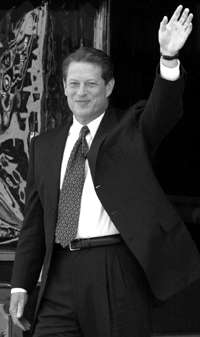
Why Gore won’t win (Aubrey Immelman, St. Cloud Times, July 9, 2000, p. 9B) — Summary: Time and again in recent electoral history the presidential candidate with the most charisma routinely has emerged the winner. Al Gore’s storied stiffness, wooden demeanor, and lack of charisma eclipse his positive attributes as a candidate. A study of his political personality reveals a dutiful, conscientiousness character infused with the distinctly aloof demeanor of an introvert. The characteristically solemn mood of conscientious personalities is conveyed in an unrelaxed, tense demeanor associated with tight emotional control. Not surprisingly, Gore is publicly perceived as stiff and formal. His stiffness reflects his conscientiousness, while his wooden demeanor reveals his introversion. For Gore to become a viable contender, he should lose the self-effacing jokes and concentrate instead on conveying a clear, unadulterated message about who he is and what he stands for. Instead of trying to overcome his stiffness with a counterfeit, “connect with people” leadership style, he should capitalize on his stiffness as concrete evidence, so to speak, of his fundamental integrity. He should play up his introversion as an asset that will serve him well, enabling him to focus on the business of leadership unencumbered by the burdens of bonding with constituents and falling prey to polls.
Personality may overpower pundits, polls in this election (Aubrey Immelman, St. Cloud Times, Oct. 1, 2000, p. 9B) — Summary: Time and again since the first televised presidential debates in 1960, with the exception of Richard Nixon in 1968 and 1972, the presidential candidate with the greatest personal charisma and publicly perceived warmth or likability has won the race. The personal dimension in politics is an emerging, pivotal predictor of presidential election outcomes at the turn of the century. A critical determinant of whether people form positive or negative personal impressions hinges on their perception of others as warm and outgoing vs. cold and retiring. Al Gore is the prototype of the presidential candidate who fails to ignite the public’s passion in an era of “made-for-television” elections: the conscientious introvert — a character type that has not occupied the Oval Office since Jimmy Carter, and before him Herbert Hoover, Calvin Coolidge, and Woodrow Wilson.
Will Gore’s little lies be big turnoff for voters? (Aubrey Immelman, St. Cloud Times, October 22, 2000, p. 9B) — Summary: Careful scrutiny of Al Gore’s penchant for hyperbole and his tendency to garnish the truth with self-serving affectations permits a more nuanced perspective: Gore’s embellishments are driven by a confluence of conscientious and introverted personality patterns that constitutes a recipe for haplessness in retail presidential politics. Conscientious personalities dread disapproval, with a corresponding tendency to overvalue aspects of themselves that signify perfectionism, moral rectitude, and diligence. Few things give them greater satisfaction than showcasing their virtues and convincing others that they are right. Perhaps unfairly, but not surprisingly, others regard such conduct as self-righteous, moralistic, overbearing, and condescending. But Gore’s overconscientiousness fails to fully account for his political ineptitude and lack of social graces. Enter the strong introversive streak that permeates and colors Gore’s conscientiousness. Deeply introverted personalities frequently fail to respond appropriately to social cues, which gives rise to interpersonal awkwardness and difficulty in social communication. They are restricted in the ability to perceive emotional meaning or express feelings in social settings, and their social communications sometimes are convoluted, obscure, and abstruse.
Theories on candidate personality pan out (Aubrey Immelman, St. Cloud Times, Dec. 10, 2000, p. 11B) — Summary: Al Gore, though diligent and dutiful, is inclined to be stubborn and moralistic — a classic conscientious type. When combined with considerable aloofness, the less endearing aspects of the conscientious character can compound the candidate’s public relations problems. Introverts like Gore are not particularly warm or engaging, and their lack of social graces may be perceived as social indifference and a lack of empathy, which tends to elicit a reciprocal reaction in voters.
Election 2008: Psychological analysis of Mitt Romney
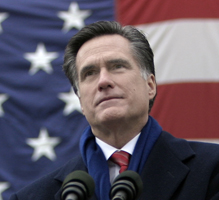
Dutiful Romney Continues Struggle for Votes (Mick Lundstrum and Aubrey Immelman, Unit for the Study of Personality in Politics, Jan. 11, 2008) — Mitt Romney, the presidential candidate better known for his Mormon faith than for his policy positions, has been dogged by obstacles and setbacks on the campaign trail. In Iowa, where he had dumped nearly three-fifths of his campaign expenditure, he was blindsided by the come-from-nowhere Huckabee juggernaut. In New Hampshire, he was bested by a resuscitated back-from-the-dead McCain campaign. … Full report
Election 2012: Psychological analysis of Mitt Romney

Mitt Romney (Photo credit: Scott G. Winterton / Deseret News archives)
Newsweek cover story: Mitt Romney is too ‘conscientious,’ quality may cost him election (Hal Boyd, Deseret News, Sep. 26, 2011) — Newsweek’s cover story on former Massachusetts’s Gov. Mitt Romney says the GOP presidential hopeful has one problem: he’s too “conscientious.” … Full report
Related reports on this site

Why Mitt Romney Won’t Win (May 12, 2011) — Excerpt: Research conducted at the Unit for the Study of Personality in Politics under the direction of Aubrey Immelman, Ph.D., suggests that Massachusetts’ health law, enacted during Romney’s tenure as governor, may be the least of his problems as he vies for the Republican nomination in a crowded GOP field. Romney lacks the personal charisma to sway non-base voters, as measured by the Personal Electability Index for presidential contenders, developed at the Minnesota-based political psychology research unit.
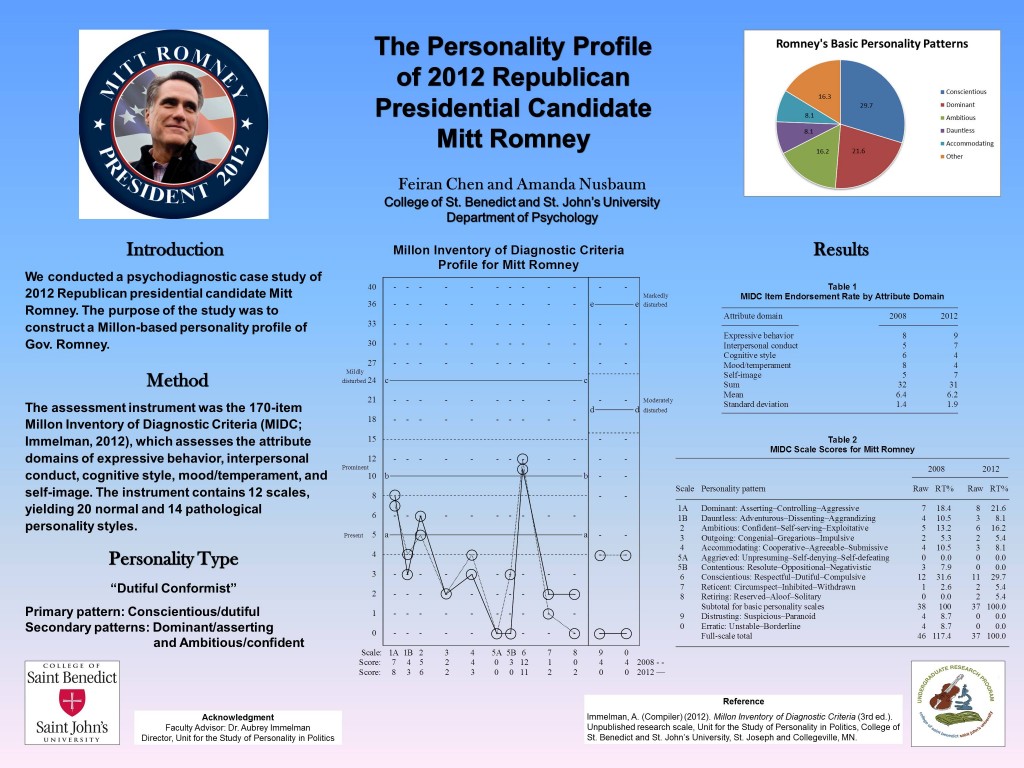 Click on image for larger view
Click on image for larger view
Mitt Romney Personality Profile (June 2, 2011) — Excerpt: A psychological analysis of former Massachusetts governor Mitt Romney, conducted in fall 2007 by Julie Seifert, Mick Lundstrum, and Aubrey Immelman, Ph.D., at the Unit for the Study of Personality in Politics revealed that Romney’s primary personality pattern is Conscientious/dutiful, with secondary features of the Dominant/asserting and Ambitious/confident patterns.
Obama Campaign Tilting at Romney Windmill (Aug. 9, 2011)
Excerpt: The Obama campaign would be misguided if it diverted inordinate resources to fending off Mitt Romney as Barack Obama’s likely opponent. Despite being the early front-runner in public opinion polls, Romney is unlikely to be the Republican presidential nominee — or, if he is, to be a viable challenger to Barack Obama. … Specifically, Romney’s score of 6 on the Personal Electability Index (PEI), which has accurately predicted the outcome of every presidential election since 1996, ranks near the bottom among presidential candidates I’ve studied in the past four presidential election cycles — slightly lower than John Kerry’s PEI score of 9 (though considerably better than Al Gore’s -17).
 Click on image for larger display
Click on image for larger display
Mitt Romney’s Leadership Style (Sept. 3, 2012) — Excerpt: A psychological profile of former Massachusetts governor Mitt Romney, developed at the Unit for the Study of Personality in Politics during Romney’s 2008 and 2012 presidential campaigns, reveals that the Republican nominee is highly conscientious, with a personality type best described as a “dutiful conformist.” Specifically, Romney is primarily a Conscientious-dutiful personality, complemented by secondary Dominant-asserting, Ambitious-confident, and Accommodating-cooperative features and a minor Retiring-reserved tendency. Romney’s personality profile provides a stable framework for anticipating his likely leadership style as president, as outlined in this report of how Romney will govern, if elected.
Why Mitt Romney Won’t Be President — In Theory (Oct. 29, 2012) — Excerpt: A heuristic model developed at the Unit for the Study of Personality in Politics to predict the winner of the presidential election prior to Super Tuesday indicates that Democratic incumbent President Barack Obama will defeat Republican challenger Gov. Mitt Romney in the November 6, 2012 U.S. presidential election.
Related report

Photo credit: John Kerry windsurfing — AP; Mitt Romney — Getty Images; Composite — The Daily Beast.
Mitt Romney: The GOP’s own John Kerry, or is he more an Al Gore? (By Michelle Cottle, The Daily Beast, Jan. 14, 2012) — Excerpt: Even within Kerry’s and Romney’s core similarities lie key differences. While both men are famously awkward and terrible at glad-handing, Romney is far more reminiscent of Al Gore than of Kerry. Kerry, like so many of his Senate brethren, is your garden-variety bore. … Watching Romney, by contrast, prompts flashbacks to Al the Cyborg Gore. It’s not that the governor is dull. Rather, it’s that he somehow manages to come across as simultaneously stiff and slick, and jarringly ill at ease with any attempt at casual banter. The timing of his jokes is off, his smiles lack warmth, and his laughter doesn’t convey mirth so much as careful programming by a consultant. … Full story

Republican presidential candidate and former Massachusetts governor Mitt Romney speaks at a campaign rally in Grand Junction, Colo., Monday, Feb. 6, 2012 — one day before the Colorado caucuses. (Photo credit: Gerald Herbert / AP via Washington Post)
Mitt Romney and the Enthusiasm Gap (Dan Balz, The Take, Washington Post, Feb. 8, 2012) — Excerpts: In the aftermath of Rick Santorum’s clean sweep of Colorado, Minnesota and Missouri, Mitt Romney is still, in fact, the front-runner for the Republican presidential nomination. But the lack of enthusiasm for his candidacy among conservatives foreshadows a potentially ugly road ahead to the party’s convention in Tampa and general-election problems if he becomes the nominee. … Full story

Republican presidential candidate and former Massachusetts governor Mitt Romney speaks at a campaign rally in Mesa, Ariz., Feb. 13, 2012. (Photo credit: Gerald Herbert / AP via The Washington Post)
Can Romney Find a Way to Connect with GOP Voters? (Karen Tumulty and Philip Rucker, Washington Post, Feb. 18, 2012) — Excerpts: MAYFIELD HEIGHTS, Ohio — To listen to Mitt Romney these days is to wish at times that someone would give him back his PowerPoint. Romney, after all, made a fortune on his ability to make a crisp presentation and close a deal. As a governor pushing for a landmark approach to health-care coverage in Massachusetts, the former management consultant won over doubters by putting together a slide presentation and taking it all over the state. So why is he having so much trouble making the sale with the Republican electorate? … Full story
Is Mitt Romney Underrated? (Chris Cillizza, The Fix, Washington Post, Mar. 25, 2012) — Excerpt: [Mitt] Romney is no world-beater as a candidate. He is awkward and somewhat tin-eared, and can seem aloof [emphasis added]. And yet, when you scan the hurdles — demographic and ideological — that Romney has overcome to emerge as the all-but-certain Republican nominee, it’s clear that he doesn’t get enough credit for what he’s accomplished. … Full story
Compare the above characterization of Mitt Romney as awkward and tin-eared, by Chris Cillizza, with an earlier assessment of Al Gore, by researchers at the Unit for the Study of Personality in Politics, as socially awkward and having a politically tone-deaf tin ear.
Bradley Seems More Accommodating Than His Rival (Katie Conlin and Kara Hansen (with Aubrey Immelman), St. Cloud Times, Jan. 16, 2000) — Excerpt: In these solitary, self-disciplined qualities [Bill] Bradley closely resembles Vice President Al Gore; indeed, of all the presidential contenders [in the 2000 election cycle], Bradley and Gore most closely resemble each other in terms of underlying character.
The combination of introverted equanimity and a conscientious, almost compulsive work ethic in Bradley’s personality have produced a focused, goal-directed man who is highly successful at whatever he chooses to do.
Although Gore also possesses these qualities in large measure, his social reserve is more acute, which feeds his social awkwardness and contributes to a tone-deaf political tin ear [emphasis added]. … Full story

Photo credit: Tolga Akmen / ZUMA Press / Newscom via Talking Points Memo
ABC/WaPo: Romney Favorability Levels Off at Lowest Mark for a Presumptive Nominee (Tom Kludt,
Talking Points Memo, Aug. 8, 2012) — After his personal popularity saw a resurgence almost immediately after he wrapped up the Republican presidential nomination, Mitt Romney’s favorability rating has plateaued at a historically low level, according to a new poll released Wednesday. … Full report
Commentary
From a personality-in-politics perspective, the root cause of Mitt Romney’s low favorability ratings is not that “attacks being levied by President Barack Obama’s campaign are beginning to stick.” Although political campaigning and negative advertising may influence a candidate’s favorability at the margins, the real explanation is that favorability is an outcome measure, or index – a dependent variable — with Romney’s underlying personality as perceived by voters being the chief input, or causal, factor — an independent variable. Because personality is temporally stable and cross-situationally consistent, Romney’s Personal Electability Index score will not vary significantly around his low PEI measure 6 and hence, his favorability is unlikely to fluctuate much, irrespective of what he or Obama might say or do in terms of campaigning.

Mitt Romney makes a campaign stop on Sept. 27, 2012 at an American Legion post in Springfield, Virginia. (Photo: M. Scott Mahaskey / POLITICO)
In the End, It’s Mitt (Mike Allen, Jonathan Martin and Jim Vandehei, Politico, Sep. 28, 2012) — It isn’t the chair or the ho-hum convention. Or the leaked video. Or Stuart Stevens. Or the improving economy. Or media bias. Or distorted polls. Or the message. Or Mormonism. It’s Mitt. … Full story

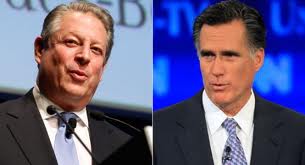
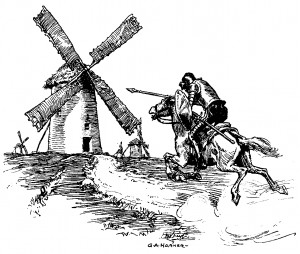









Follow Aubrey Immelman